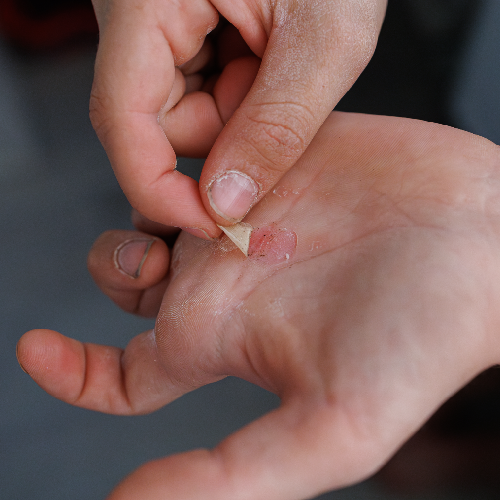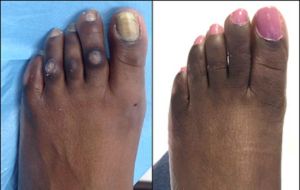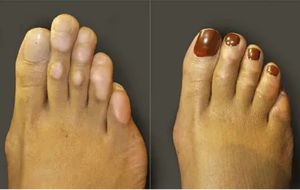Corns and calluses are common skin conditions characterised by the thickening of the skin in response to repeated friction or pressure. These areas of hardened skin develop as the body’s natural defense mechanism, creating a barrier to protect against irritation and potential injury. Corns typically form on areas of prominent pressure, such as the tops and sides of toes, while calluses are larger and often found on the soles of the feet. While these conditions are generally not harmful, they can cause discomfort, pain, and aesthetic concerns for individuals. Understanding the causes, signs, and appropriate treatment options is crucial for managing and preventing the recurrence of corns and calluses.
Book Your Appointment
Book Your Appointment

What are Corns and Calluses?

Causes of Corns and Calluses
● Friction and Pressure: The primary cause is repetitive friction or pressure on specific areas of the skin.
● Ill-Fitting Footwear: Shoes that are too tight or have high heels can contribute to the development of corns and calluses.
● Not wearing socks: When people tend to wear shoes directly and skip socks or socks are pitting then it increases chances of pressure and friction.
● Poor Biomechanics: Abnormal walking patterns or gait abnormalities can lead to increased pressure on certain foot regions.
● Age: The skin’s ability to regenerate decreases with age, making older individuals more prone to corns and calluses.
● Certain Activities: Engaging in activities that involve repetitive pressure or friction, such as running or playing musical instruments, can contribute.

Signs of Corns and Calluses
● Thickened, Hardened Skin: Corns and calluses are characterised by areas of thickened, rough skin.
● Localised Pain: Discomfort or pain may be experienced when pressure is applied to the affected area.
● Visible Bump or Lump: Corns may appear as a raised, conical bump, while calluses often present as a more diffuse, flattened area.
● Dry, Flaky Skin: The skin in the affected area may become dry and flaky.

Difference between Corns and Calluses and Preventive Tips
Corns: They can be small in size and have a hard center and inflamed skin around them. If pressed they can be painful. They usually develop on pressure regions; on feet, those have ill-fitting shoes. They occur on the sides, top, or between the toes. They can be removed by corn removal procedure at a dermatology clinic.
Calluses: They are usually larger than a corn. They occur on the soles of feet and are painless. They can appear below the balls or heels, on the palms or knees.
Lifestyle and Home care Preventive tips:
● Wear Footwear that is comfortable
● Use leather gloves
● Apply corn plaster or cushion to even out the pressure
● Use warm saline water to soften it up by soaking the affected area in it.
● Use a nail file, and pumice stone to remove thick skin
● Keep affected areas hydrated by applying moisturizer or lubricating ointment.

Treatment for Corns and Calluses at Dr. Haror’s Wellness
● Customised Footwear Recommendations: Dr. Haror’s Wellness provides guidance on proper footwear to alleviate pressure on affected areas. It is a noncontagious issue and preventive measures can help in this.
● Orthotic Inserts: Customised inserts or padded shoes can help distribute pressure evenly and prevent the formation of corns and calluses.
● Topical Treatments: Specialised creams and ointments to soften and reduce the thickness of the skin. Callus can be removed by applying a 40% salicylic acid patch as recommended by a doctor.
● Professional Removal: In some cases, a healthcare professional may safely remove excess skin to alleviate discomfort. Using a scalpel they remove the excess/thick affected skin
● Addressing Underlying Conditions: Identification and management of underlying foot conditions contributing to corns and calluses.
● Education and Prevention: Dr. Haror’s Wellness focuses on patient education to prevent recurrence, including proper foot hygiene and self-care practices.

Other Services Offered
Explore the diverse spectrum of services at Dr. Haror’s Wellness, where we specialize in crafting personalized experiences to cater to your individual requirements. Your transformative journey towards a ‘new you’ starts here!

Expertise personified:
Meet the Guru
Founded and led by Dr. Navnit Haror, a pioneer in aesthetic medicine. He is a dermatologist and a true expert in the art of skincare, widely recognized as a practitioner and expert in Aesthetic Surgery.
Fueled by an unyielding dedication to elevating skin radiance, Dr. Haror's proficiency shines in the dynamic field of Corns and Calluses treatment. This technique, celebrated worldwide, showcases his pioneering approach. Utilizing state-of-the-art methodologies and premium resources, he embarks on a transformative expedition, granting individuals renewed self-assurance. With precise attention and an in-depth grasp of skin dynamics, Dr. Haror tailors each Corns and Calluses procedure to precise needs, setting a new standard for exceptional results.


Our Doctors
We are founded, managed, and led by one of the world’s finest Aesthetic Surgeons, Dr. Navnit Haror and Dr. Vineeta Pathak.

Dr. Navnit Haror
Gold Medalist | Dermatologist| Hair Transplant Surgeon
Internationally acknowledged as a domain expert and practitioner of Aesthetic Surgery, Dr. Navnit Haror is a Dermatologist and Hair Transplant surgeon in practice since 2012 and is the Founder-Director of Dr. Haror’s Wellness. He has trained over 12,000 clinicians and doctors in hair transplantation techniques across 17 countries.

Dr. Vineeta Pathak
Consultant Cosmetologist | Hair Transplant & Aesthetic Surgeon
An award-winning dermatologist, Dr. Vineeta Pathak specializes in cosmetic dermatology and all aesthetic procedures. Her expertise includes vitiligo surgeries and ear lobe reconstruction, permanent hair reduction, hair transplants, lasers, and all aesthetic procedures among others.

FAQs
Empower yourself with knowledge and make informed decisions as you find answers to commonly asked questions about our services
Are They Painful?
Corns can be painful, especially if they press on nerve endings. Calluses are generally painless but may cause discomfort due to their size and thickness.
How Can They Be Prevented?
Wearing properly fitting shoes, using protective pads, and maintaining good foot hygiene can help prevent corns and calluses.
When Should I See a Doctor?
If corns or calluses cause pain, interfere with daily activities, or if you have diabetes or poor circulation, it’s advisable to consult a healthcare professional.
Can Anyone Get Corns and Calluses?
Yes, anyone can develop corns and calluses. However, individuals with foot deformities, such as hammertoes, or those who frequently wear ill-fitting shoes, are more prone.
Are There Complications Associated with Corns and Calluses?
While corns and calluses are generally harmless, complications can arise, such as infections or ulcerations.





